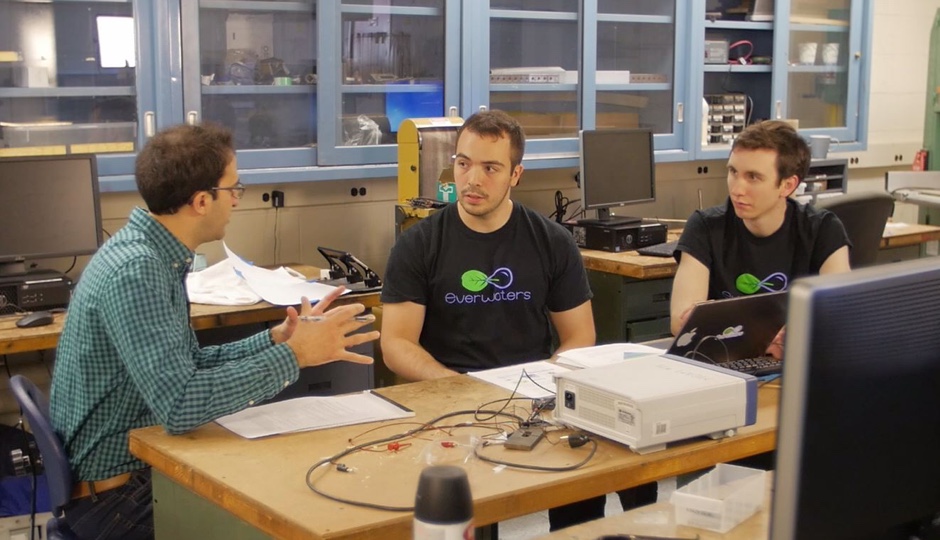3 Lessons From CNBC’s Make Me a Millionaire Inventor

Make Me a Millionaire Inventor co-host George Zaiden with Everwaters co-founders Adrian Lievano and Matt Lisle.
On last week’s episode of CNBC’s new docu-series Make Me a Millionaire Inventor, two recent University of Pennsylvania graduates landed a $20,000 deal for what investors said might save the world and make millions.
Inventors Adrian Lievano, 23 and Matt Lisle, 24 pitched the MOWA, a water filter that uses the protein of the moringa seed to hinder the growth of microbes in water. The filter, cheaper than other systems on the market, would serve to improve clean water access for families in East Africa, their target market. The inventors, also the founders of the startup Everwaters, also see the filters as a way to address the lead that’s been found in America’s drinking water. The duo started developing the filter just a year ago after receiving mechanical engineering degrees from Penn and after spending a few months in Kenya and witnessing the hardship of unsafe drinking water firsthand.
In its second season, Make Me a Millionaire Inventor, unlike the hit ABC series Shark Tank (which has showcased a number of Philadelphians), takes viewers along on the demanding journey entrepreneurs take to bring their ideas to fruition and offers the inventors development support along the way. After undergoing the commercialization process with the show’s hosts, Lievano and Lisle say it’s satisfying to have a product that they started conceptualizing only a year ago. Here are the top three lessons about commercialization that Lievano and Lisle took away from the process:
1. Be scrappy.
“As mechanical engineers, we were trained to rapidly prototype,” said Lisle. To not get bogged down with making a perfect product, it’s important to make a prototype that proves your theory or fulfills the function you’d like it to do. “From there you can make the money you need to accelerate the development of that product to the next phase.” Back in March the team still relied on a bucket as their prototype, and in July, they were able to begin manufacturing the actual product that they just launched a Kickstarter campaign for.
2. Understand the competition.
To create a product of value, Lievano said it was important to understand the other products in the same space. They learned that to be successful, they would need to create a product that was cheaper and more effective than the filters already on the market. Their $39 COWA water filter model, which uses a coconut carbon filter and ceramic outer shell, boasts the capacity to remove contaminants that other filters can’t including chlorine, metals like arsenic and bacteria like E. Coli. The filters can last for up to 400 gallons of water, which would cost $676 on average.
3. Accept that your idea will change.
Before even working on a water filtration system, Lievano and Lisle worked on developing a 3-D robotic arm. And after months of developing the water filter and after several iterations of the product, they’re now testing the latest version of it in Kenya. “We had to be able to handle the fluctuations in the product development cycle because our product has changed so many times,” said Lisle, who hopes they’ll be able to reach one million families over the next five years.
Follow @fabiolacineas on Twitter.


